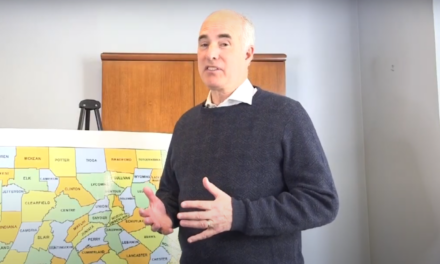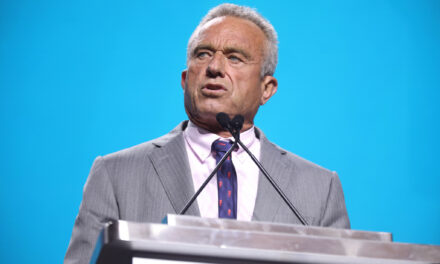We support our Publishers and Content Creators. You can view this story on their website by CLICKING HERE.
When Louise Joy Brown became the first “test tube” baby to survive pregnancy and birth on July 25, 1978, the world had mixed feelings. On one hand, Brown’s entry into the world via in vitro fertilization proved those with infertility diagnoses were not immediately limited to a life without biological children. On the other hand, Brown’s conception and birth introduced a whole host of moral and ethical dilemmas that are still relevant today.
Netflix’s “JOY – The Birth of IVF,” a period drama, uses choppy storytelling to trace embryologist Jean Purdy, biologist Robert Edwards, and obstetrician Patrick Steptoe’s decade-long attempt to “make the impossible possible” with the lab conception that ultimately led to Brown’s existence.
While “Joy” attempts to grapple with some of the ethical hurdles facing IVF, the movie ultimately fails to fully explore the low rate of success (the trio ultimately experimented on 282 women but only yielded five pregnancies and two births) and moral hangups that came with the group’s IVF trials. Instead, the film focuses on framing widespread skepticism about the quest to “cure childlessness” as opposition to scientific progress and “reproductive care.”
There’s no doubt that conceiving children in a petri dish was an incredible scientific and technological feat. The downsides of “Frankensteining” reproduction, however, were not lost on the public — even in the 1960s and 70s.
The movie devotes a large portion of its run time to highlighting this response. Several, including Purdy’s religious mom, are seen warning her offspring against “playing God” with men like Steptoe, whose foray into IVF was only possible thanks to his lengthy and profitable history as an abortionist. She also threatened — and later made good on her promise — to ostracize Purdy due to her objections to the woman’s involvement in developing IVF.
“I’m not performing abortions, Mum,” Purdy, who struggles with endometriosis and learns she can’t have children of her own after years of unprotected premarital sex without a pregnancy, said. “And I’m proud of what I’m doing.”
When a morally convicted Purdy confronts a member of Steptoe’s staff about the reasons they pursued IVF research, she learns what is still true today: IVF and abortion are inextricably linked in both practice and politics.
“I thought we were here to make babies,” Purdy pressed.
“Well you’re wrong,” Steptoe’s matron nurse replied. “We are here to give women choice. Every choice. That’s all that matters to me and that’s all that should matter to you. So buck up.”
Despite the group’s best efforts to pump women, one of whom remarks she “can’t help but feel like cattle,” full of the hormones necessary to prep their bodies for egg harvesting, they get nowhere. Frustrated by years of pushback and no successful pregnancies, Purdy opted to step away from the project and return home to care for her ailing mother. The other IVF researchers, without Purdy’s participation, dropped their research shortly after.
Purdy tried to use her time away to repair her relationship with her disapproving kin and church but eventually returned to the lab after her mother passed away. It was with that second wind that the scientists used what they learned to impregnate Lesley Brown with a baby conceived in a petri dish. Unmentioned are countless microscopic lives lost to nearly a decade of experimentation.
Politicians on both sides of the aisle claim supporting IVF is good because it helps couples conceive and boosts flailing birthrates. Big Fertility even frames biological participation in IVF via egg and sperm sales as a charitable act that helps people in need.
The reality of the practice, however, is a million embryos destined to be indefinitely stuck in cryogenic freezers and millions more that, after suffering through eugenics-like testing, are destined to be discarded. Nearly 50 years after it became a reality, IVF has fueled the fertility industry’s penchant for prioritizing profit over people, quick fixes over long-term women’s health solutions, and making human existence transactional.
The technological developments that led to lab conception may be responsible for the births of millions of children. Contrary to the movie’s jubilant title, the IVF it celebrates has also led to the deaths of millions and wreaked physical and emotional consequences on men, women, and children across the globe.
When Purdy, Edwards, and Steptoe were in the throes of their experiments, the press, clergy, and other scientists warned about the gateway IVF could serve for dehumanization.
“You’re a scientist seemingly unengaged in the consequences of your work,” the character playing the father of DNA science Dr. James Watson remarks in the movie. The real-life Watson was so sure that IVF’s downsides outweighed the benefits that he told a congressional committee in 1974 that normalizing implanting test tube babies in women means “all hell will break loose, politically and morally, all over the world.”
“This is not about killing children. It is about making them,” Edwards retorted in the movie debate with the Nobel Prize winner. Yet, it was in that same breath that Edwards claimed “everyone who wants one deserves to have a child.”
Whether it is politically, scientifically, or artistically advantageous or not to acknowledge, IVF’s roots lie in accommodating the desires of adults without regard for the commodification of children. Purdy, Edwards, and Steptoe’s scientific development may have paved the way for millions of pregnancies and births, but it has also opened the door for horrors like switching embryos at birth, designer babies, motherless and fatherless children, the erasure of women’s vital role in reproduction, and fraud.
“Joy” not only diminishes the earliest anxieties about those realities but seeks to mask them under a dramatized, one-sided version of a feel-good story. The birth of Brown, like any baby, is worth celebrating. But the truth about the means used to justify that end does not always elicit joy.
Jordan Boyd is a staff writer at The Federalist and producer of The Federalist Radio Hour. Her work has also been featured in The Daily Wire, Fox News, and RealClearPolitics. Jordan graduated from Baylor University where she majored in political science and minored in journalism. Follow her on X @jordanboydtx.

 Conservative
Conservative  Search
Search Trending
Trending Current News
Current News 





